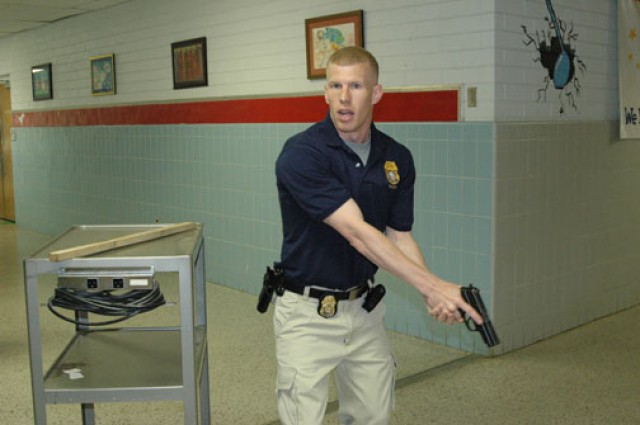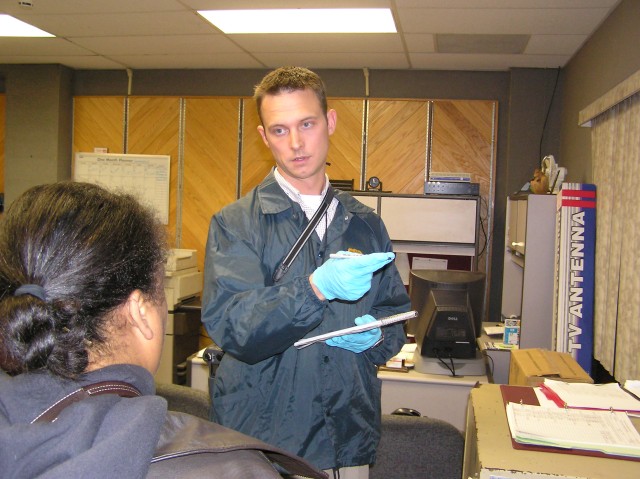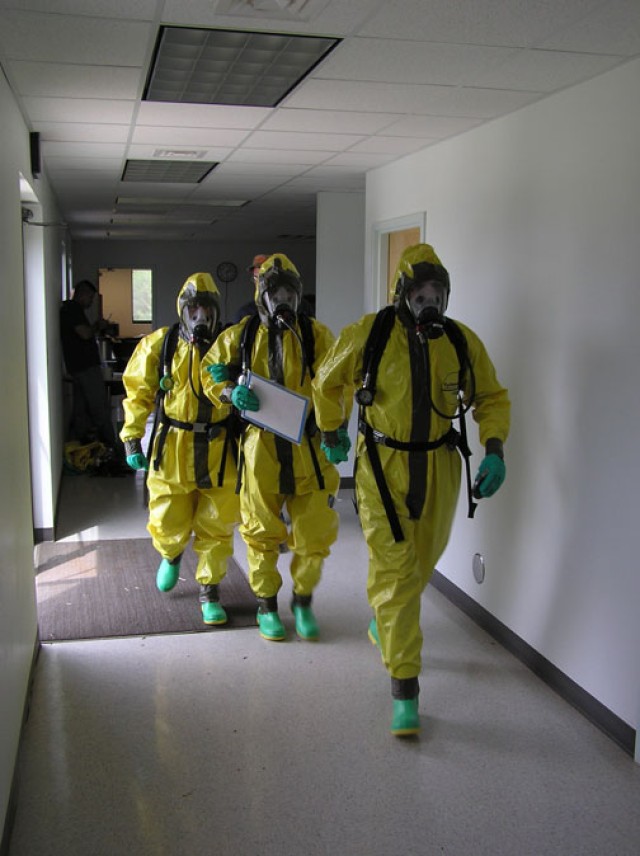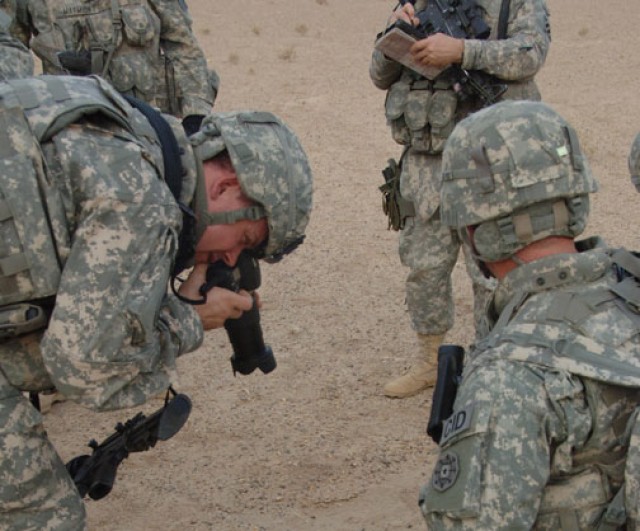











THROUGHOUT modern military history, a specialized organization within the Department of Defense has patrolled the globe. Deployed in times of crisis, its members perform an extremely sensitive yet essential mission. They serve the greater-Army community and assist their fellow Soldiers.
The men and women of the U.S. Army Criminal Investigation Command, commonly referred to as CID, have a clear mission: to pursue truth as they strive to make the Army stronger by bringing those few in the ranks who commit crimes, or those who commit crimes against the Army, to justice.
'Many people don't realize the impact that we have on a person's life, the impact we have on the Army,' said Special Agent Edgar Collins, the deputy chief of investigative operations for CID. 'In a sense, we are defending the honor of the United States Army. and that makes our job crucial.'
Headquartered at Fort Belvoir, Va., CID is a worldwide network of highly trained special agents responsible for investigating felony-level crime. Their work environment is unforgiving. Murder, fraud, arson and sexual assault are just a few of the types of investigations spearheaded by these federal law enforcement professionals.
'This is not a television show, this is real life, and these are people's lives,' said Special Agent Clifton Dyer. 'The job can get really ugly sometimes, but what could be more important than helping Soldiers and their Families in a time of crisis'
'It's just too bad that people sometimes focus only on the bad guy we put away, and not the Soldiers or the Family members that we helped,' Dyer added.
Serving a population of more than 1 million Soldiers, civilians, contractors and Family members-both while at home and deployed-CID provides an invaluable resource to commanders at posts, camps and stations. CID special agents not only investigate crimes, they conduct logistics security operations and assessments, as well as criminal intelligence and economic crime/extremist criminal activity threat assessments. On the battlefield, CID special-agent criminal investigations are expanded to include war crimes, as well as anti-terrorism and force-protection missions.
CID comprises approximately 2,500 Soldiers and civilians, and is organized into six major subordinate groups. It is specifically structured to prevent undue command influence, allowing for unencumbered investigations. A stovepipe organization, CID reports directly to the chief of staff and secretary of the Army, to ensure all known and suspected crimes are investigated thoroughly and impartially.
'It's unfortunate, but with most communities of 1 million plus, crime is going to happen,' said Special Agent Jennifer Bryan, chief of economic crimes and logistic security. 'Still, it speaks very highly of an organization that has the strength of character to investigate itself, regardless of what the outcome may be.'
During World War I, American expeditionary forces entered France. As the Army expanded in both size and strength, so too did the crime rate. From this expansion, the need for a criminal investigative organization was born. In 1918, Gen. John J. Pershing directed the Army's provost marshal general to organize the first Criminal Investigation Division within the newly established Military Police Corps. Today, the command retains the 'D' in its official title, USACIDC, as a historical reminder; hence the common reference to the organization is 'CID.'
Established as a separate major Army command Sept. 17, 1971, USACIDC was redesignated as a direct reporting unit Oct. 1, 2004, reporting to the provost marshal general of the Army, who also serves as the commanding general of CID. This structure gives the Army's senior leadership a comprehensive, single source for all Army law enforcement matters.
Throughout its history, CID has maintained a high operational tempo, and continues to support Army missions and operations around the world, whenever and wherever the Army operates.
The workhorses of the command are the six subordinate units: 202nd Military Police Group (CID), 3rd Military Police Group (CID), 6th Military Police Group (CID), 701st Military Police Group (CID), the U.S. Army Criminal Investigation Laboratory and the U.S. Army Crime Records Center.
Each of these organizations performs a vital function for CID, as well as providing the Army and DOD with personnel who possess the critical investigative skills unique to CID special agents. CID investigations are routinely, and successfully, prosecuted in military and federal judicial forums, as well as in state courts and foreign judicial venues across the globe.
The 3rd, 6th and 202nd Military Police Groups conduct felony criminal investigations, such as murder, sexual assault, grand larceny, drugs and child abuse. They also execute crime prevention operations and preserve the force and Army resources operations within a specific geographical area of responsibility. This also includes major Army commands. Ever vigilant, agents perform this mission both at home and while deployed.
'Unlike other Army units, who have a specific mission deployed and then a training mission at home, our mission never stops,' Collins said. 'It's an unfortunate truth, but we often meet people on possibly the worst day of their life.
'These are people who have had a crime committed against them, not just their property, but them,' Collins said. 'So what we do, day in and day out, is extremely important.'
The 701st Military Police Group, co-located with CID headquarters, is home to four specialized units. Just like its higher headquarters, it has a worldwide area of responsibility. These units are the Protective Service Battalion, the Computer Crimes Investigative Unit, the Field Investigative Unit and the Major Procurement Fraud Unit.
Much like the Secret Service, PSB is tasked with providing personal protection for key DOD and Army officials worldwide. This unique mission is mandated by Congress and includes protecting the secretary of defense, secretary of the Army and the chairman of the Joint Chiefs of Staff.
When requested, PSB special agents also provide protection for foreign military dignitaries, general officers and VIPs visiting Army installations stateside and overseas.
As the Army's cyber-detectives, CCIU's primary mission is to conduct criminal investigations of intrusions and related malicious activities involving Army computers and networks.
Highly respected players within the cyber-security community, several CCIU special agents and alumni have been recently recognized by leading law enforcement organizations, such as the International Association of Chiefs of Police and the Office of the United States Attorney General.
'Because of my background, I was able to go over and speak with our international partners at NATO and help address concerns about emerging cyber-security issues,' said Howard A. Schmidt, special assistant to the president and cyber-security coordinator, and a former CID special agent.
While assigned to CCIU, Schmidt was detailed to the CID counterintelligence cell at the Joint Task Force-Computer Network Operations with the Defense Information Systems Agency.
The 'quiet professionals' of CID, the Field Investigative Unit investigates cases requiring extreme sensitivity. This includes investigations involving classified activities, cases of national interest, of interest to the Army's leadership, special access programs and investigations of Army senior leaders or general officers.
The shining star in the war against fraud, the Major Procurement Fraud Unit centrally directs and coordinates investigations of fraud worldwide. Because of the complex nature of the investigations and the time involved, MPFU is comprised entirely of civilian special agents who have extensive experience investigating white-collar crimes.
MPFU investigations include procurement of major weapons systems, support systems, and civil and military construction contracts awarded and/or managed by the Army Corps of Engineers. Historically, MPFU's recoveries have exceeded the entire annual CID operating budget.
'We are one of the only commands that actually makes money for the Department of Defense,' said Special Agent Michelle Chowaniec, the acting resident-agent-in-charge of the Hartford Fraud Resident Agency. 'Most of our cases involve complex schemes, often with major corporations or defense contractors, and very sophisticated bad guys.'
The U.S. Army Criminal Investigation Laboratory, located just outside Atlanta, provides forensic laboratory services to all DOD investigative agencies, as well as other federal law enforcement agencies. The laboratory conducts state-of-the-art forensic examinations in drug chemistry, trace evidence, serology (body fluids), DNA, latent prints, forensic documents, digital evidence and firearms and toolmarks.
'Most folks don't understand that you cannot process a crime scene in an hour, and a criminal investigation is not closed in a day, but it does make for good TV,' said Special Agent Brian Janysek, a forensic science officer and the special-agent-in-charge of the Fort Belvoir Resident Agency. 'Besides, our lab (USACIL) is the lab for all the military investigative agencies.'
A unique aspect of CID special agents, especially those working general crime investigations, is their involvement in the case, from the moment they walk onto the scene until the case is closed. Some federal law enforcement agencies or major police departments have crime scene technicians or evidence collection teams to process a scene. CID special agents process the scene themselves, collecting evidence, photographing and recreating events, thus affording the investigators an intimate knowledge of what took place.
Established in 1950, the U.S. Army Crime Records Center, also collocated with CID headquarters, supports not only USACIDC and the DOD, but also foreign, federal, state and local law enforcement agencies.
As the keeper of all Army law enforcement information, USACRC receives, safeguards, maintains and disseminates information for law enforcement purposes. The center also serves as the authority for Army law enforcement Freedom of Information Act and Privacy Act information.
Another major function of the center is the management of the Army law enforcement Polygraph Program. Special agent polygraphers attend a grueling six-month training program at the DOD Polygraph Institute, considered to be one of the most academically challenging courses in the military today.
Special agents are the backbone of the command. Often dressed in civilian attire, these highly skilled noncommissioned officers and warrant officers are sworn federal law enforcement officers. There are some civilian special agents within the specialized units, specifically MPFU and CCIU, however, the bulk of the force is Soldiers, many who have attended advanced programs in law enforcement techniques, criminal investigations, tactics and procedures.
Special agents are recruited internally from across the Army from every military occupational specialty. However, all agents share a common background: attendance at the Apprentice Special Agent Course, conducted by the U.S. Army Military Police School at Fort Leonard Wood, Mo.
The comprehensive, 15-week course provides the foundation for all special agents with a basic level of knowledge pertaining to criminal investigations. Many within the federal law enforcement community, both military and civilian agencies, view the course as the best basic special agent training program in the United States.
'Our program is the best there is, period,' said Special Agent Ronald Meyer, chief of the Physical Evidence Branch at USAMPS. 'Whereas, at other institutions, their prospective special agents spend maybe two days learning how to process a crime scene, our students here at Fort Leonard Wood spend about two weeks.
'It's like trying to compare apples and meat,' Meyer added. 'There is no comparison between our program and anything else on the market.'
Advanced training opportunities for those within the command include some of the premiere law enforcement training programs in the world, such as the FBI National Academy, Scotland Yard Academy or the Canadian Police College.
A unique aspect of these programs for CID special agents is that they are offered to those who need it most-the agent in the field. Other federal law enforcement agencies and major police departments often reserve this type of training for their senior investigators or chiefs of police.
CID continues to adapt to the needs of the 21st century, providing quality investigative support worldwide to commanders and warfighters alike.
Innovative programs, such as the addition of highly qualified experts in forensic science, investigations and prosecution to assist in the training of special agents, and the deployment of special sexual assault investigators to establish Special Victim Units at major Army installations throughout the world, are just a few examples of the command's dedication to the community it serves.
The key to success in meeting the Army's future investigative challenge is the Soldier- and civilian-agent whose continuing mission is to live the CID motto: 'Do what has to be done.'